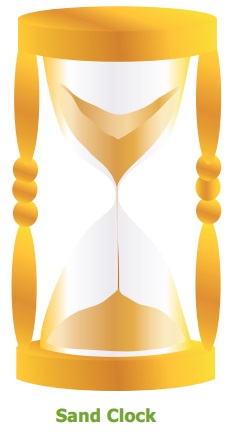Measurements | Term 1 Unit 1 | 6th Science - Time | 6th Science : Term 1 Unit 1 : Measurements
Chapter: 6th Science : Term 1 Unit 1 : Measurements
Time
Time
Day changes into
night and night in to day. Seasons also change. We know time passes. How do we
measure the passage of time? Clocks are used to measure time. You know how to
read a clock face and note the time. You can also use your pulse to measure
‘rough’ time. Count the number of pulses. That can tell you the time elapsed.
In your normal speed of speaking, say “one little second”; “two little second”
to count the passage of time.
Activity
6
Ask
four or five of your friends to run a race from one end of the school to
another. Mark the starting point and the ending point. Using your pulse (or
counting by saying ‘one little second’ etc) count the time taken for each of
them to complete the race. Check who is faster?
In earlier days people used sand
clock and sundial to measure the passage of time during the day. The
shadow cast by a stick can be used to estimate time. One can also use a
vessel with a small hole for computing time. Take a vessel or bottle with a
small hole in it and fill it with water. The time taken for water to drain can
also be used as a measuring device.
These are rough methods for counting
passage of time. We can use electronic clock, stopwatch and other instruments
to count even smaller durations of time.

Fast
Facts
An odometer is a device used for
indicating distance travelled by an automobile.
The metric system or standard set of
units was created by the French in 1790.
A ruler or scale, used now a days to
measure length was invented by a William Bedwell in 16th century.
A standard metre rod made of an
alloy of platinum and iridium is placed at the Bureau of weights and measures
in Paris. National Physical Laboratory in Delhi has a copy of this metre rod.
One kilogram is equal to the mass of
a certain bar of platinum-iridium alloy that has been kept since 1889 at the
International Bureau of Weights and Measures in Sèvres, France.
• The quantity of blood in a human body
is approximately 5 liters.
Related Topics